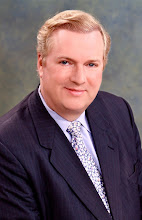(Buchanan, Michigan)
This week's campaign travel took me to Buchanan, a beautiful town of about 5,000 people, in Berrien County, Michigan. (Berrien County lies just across the Indiana state line and is perhaps best known as the home of Benton Harbor, a coastal city.)
 Buchanan may be the birthplace of an idea which could change American politics. The goal is finally to remove Iowa and New Hampshire from always holding the "first-in-the-nation" caucuses and primary elections. This year Michigan and Florida, as two of our nation's largest states, broke the party rules and tried to leapfrog the other early primaries in an effort to exert greater influence on the presidential process. Like many of the people in other heavily populated states, Michiganders and Floridians are tired of having less say in choosing the nominees of both parties.
Buchanan may be the birthplace of an idea which could change American politics. The goal is finally to remove Iowa and New Hampshire from always holding the "first-in-the-nation" caucuses and primary elections. This year Michigan and Florida, as two of our nation's largest states, broke the party rules and tried to leapfrog the other early primaries in an effort to exert greater influence on the presidential process. Like many of the people in other heavily populated states, Michiganders and Floridians are tired of having less say in choosing the nominees of both parties. "Look at the state of Iowa," says local Democratic activist Jess Minks. "It is a very small minority (of the U.S. population)." Only three serious Democratic candidates survived Iowa, and only four Republicans. By Super Tuesday, when 24 states cast ballots, such favorites as John Edwards and Rudy Giuliani were gone. Millions of voters never had a chance to have their opinions count.
 The issue of what states go first is not entirely political either. Some of it is economic. "Iowa gets ten million dollars each year," says local Democratic candidate John Klimek. And he has a point. The early primaries and caucuses are front loaded with media, delegates, party activists, etc. That's a lot of hotel rooms and restaurant receipts. The economic boon is a bonus. Later states aren't so prosperous, especially if a nominee is selected early.
The issue of what states go first is not entirely political either. Some of it is economic. "Iowa gets ten million dollars each year," says local Democratic candidate John Klimek. And he has a point. The early primaries and caucuses are front loaded with media, delegates, party activists, etc. That's a lot of hotel rooms and restaurant receipts. The economic boon is a bonus. Later states aren't so prosperous, especially if a nominee is selected early. What the Michigan delegation would like to see is a staggered primary season. The nation would be divided into three regions: East, central and west. Each individual region would hold a lottery to see which four states vote first, and then the other regions and states would rotate over the course of weeks, if not months. Every primary season would begin with a different region. Imagine in January of 2012 New Mexico, Oregon, Montana and Utah having the first four primaries. The following week, it might rotate to Michigan, Delaware, New York and Kentucky. The next week, Wisconsin, Oklahoma, North Dakota and Texas. Then in 2016 the primaries might start in the east, and maybe New Hampshire gets to go first again. The idea is variety and change. The state order would be determined by lottery.
"Finally, everyone is going to get an opportunity to go first," says Jess Minks. His cohort John Klimek says the idea of a more equitable system is crucial to retaining all the young voters who got involved this year - young voters who had appeared indifferent in the past. "This young, vibrant group that is now involved is going to walk away," Klimek says, "if the primary system is not fixed."
 Michigan and Florida bucked the party and lost their delegates in the process. In many ways it was a protest vote. On Saturday a committee of the Democratic National Committee meets in Washington, DC, to decide the fates of those disputed convention delegates. Hillary Clinton can't win the nomination without them, and Barack Obama may not win in November without their support if they walk away.
Michigan and Florida bucked the party and lost their delegates in the process. In many ways it was a protest vote. On Saturday a committee of the Democratic National Committee meets in Washington, DC, to decide the fates of those disputed convention delegates. Hillary Clinton can't win the nomination without them, and Barack Obama may not win in November without their support if they walk away. "What Michigan and Florida are doing is the right thing," says Jess Minks. We'll find out Saturday, and again in 2012, whether he is right!
I will have more on the campaign from the Midwest this week, then it's on to South Dakota and Montana Sunday for the final two primaries on Tuesday. By the way, Puerto Rico votes on Sunday. There is a lot going on, so keep checking at www.MarkCurtisMedia.blogspot.com.
Get trade secrets for amazing burgers. Watch "Cooking with Tyler Florence" on AOL Food.

No comments:
Post a Comment